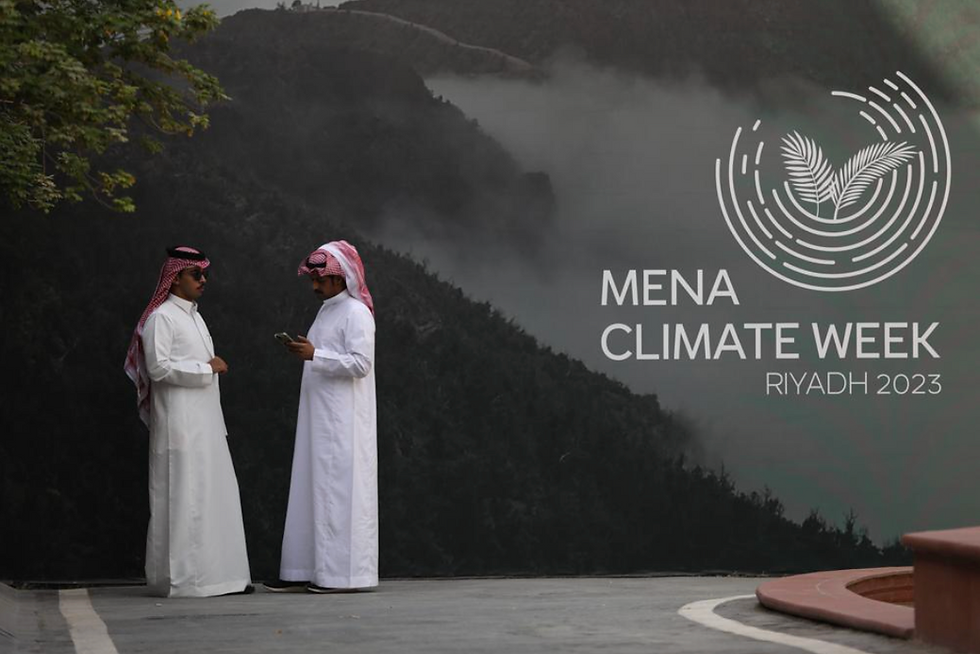Top Takeaways: Middle East and North Africa (MENA) Climate Week 2023
- Katie McCabe

- Nov 8, 2023
- 4 min read
Updated: Nov 13, 2023
Representatives and stakeholders from the Middle East and North Africa (MENA) met in Riyadh, Saudi Arabia for their second annual Climate Week Oct. 8 to12. This Climate Week served as an opportunity for stakeholders to explore methods for implementing the Paris Agreement in MENA and discuss their expectations for the upcoming COP28, which will also be hosted in the region. This year, the theme of MENA Climate Week was “Advancing Inclusivity and Circularity for Just and Equitable Energy Transitions.” The Climate Week was structured around various themes, including Energy Systems and Industry; Cities, Urban and Rural Settlements, Infrastructure, and Transport; Land, Ocean, Food, and Water; and Societies, Health, Livelihoods, and Economies. The main takeaways from MENA Climate Week 2023 below highlight that climate change adaptation and clean energy transitions will likely be the main focus of MENA delegates at COP28.

Representatives open MENA Climate Week 2023 (1).
Top Takeaway #1: Greenhouse Gas Crediting and Offsetting Mechanism
Saudi Arabia’s Greenhouse Gas Crediting and Offsetting Mechanism, or GCOM, is our first MENA Climate Week Takeaway. Even as a country with a prominent oil production industry, Saudi Arabia is placing an emphasis on net-zero emissions, and encouraging other MENA oil-producing countries to do the same. Alkabsi, one of the main speakers for GCOM, insisted that the program will help Saudi Arabia reach its Nationally Determined Contributions (NDCs) under the Article 6 of the Paris Agreement and follow a pathway to reach net-zero emissions by 2060. GCOM includes rigorous record-keeping of carbon credits from issuance to retirement within production. The overarching goal of GCOM is to allow countries to reduce emissions without completely phasing out fossil fuels. So far, discussions like these have emphasized alternative methods, such as carbon capture and improved methane sequestration, in lieu of fossil fuel phase-out. These net-zero sentiments contrast with the mitigation goals of climate justice groups like the COP28 Coalition, but they will still likely be prominent discussion points at COP28.

Launch of Saudi Arabia’s GCOM at MENACW 2023 (1).
Top Takeaway #2: The Global Cooling Pledge
Our second takeaway from MENA Climate Week 2023 (MENACW) is the announcement of a Global Cooling Pledge to be launched by Sultan Al Jaber, the President-designate of COP28, at COP28 in Dubai. The Global Cooling Pledge is a climate change adaptation initiative which highlights the need for large-scale cooling systems, especially in Arab countries already experiencing the impacts of global warming. The pledge calls for counties to begin adapting to rising temperatures by generating more policies on energy efficiency and access, climate-friendly cooling systems, and cold chains for food and vaccine transport and storage. Currently, The Global Cooling Pledge calls for broad adaptation strategies rather than specific action steps. Moreover, a specific definition of “global cooling” has not yet been defined by the President-designate. Understanding the true meaning of The Global Cooling Pledge is important from a climate justice perspective, as the mentioned cooling strategies are wide-ranging and could have a variety of impacts on communities. Additionally, focussing on “cooling” instead of global warming adaptation could potentially shift political discourse at COP28. These concerns will likely remain unaddressed until further Cooling Pledge details are announced at COP28.
Top Takeaway #3: A Slow Transition From Fossil Fuels
Our broad, yet prominent, final takeaway is the industrial and economic reasons that MENA did not yet call for a complete rejection of fossil fuel production. Speakers at MENA Climate Week emphasized that the energy transition away from fossil fuels must be gradual and should prioritize new technologies and private sector investments. Among the new technologies mentioned were carbon capture and methane removal, which aim to remove harmful greenhouse gas emissions after the combustion of fossil fuels. These technologies will allow MENA countries to start reaching their greenhouse gas emission reduction goals under the Paris Agreement while still fostering petroleum industries. Khalid Almehaid, the Chief Climate Negotiator from Saudi Arabia, highlighted this idea, arguing that “hydrocarbons will remain in the energy mix” in the region’s transition away from greenhouse gasses. Through this slow transition away from hydrocarbons and fossil fuels, the region hopes to create a circular carbon economy that promotes industrial growth and management of emissions. Representatives at MENA Climate Week argued that private investments and public-private partnerships are the path to achieving this goal.
Speakers stressed that a slow transition from fossil fuels and partnerships with the private sector will allow the region to achieve a just energy transition (2). Since the MENA region consists of some of the world's top oil-producing countries, MENA representatives believe that a very gradual transition from fossil fuels is necessary for the region’s economies. These just energy transition arguments contrast with the climate justice arguments of UNFCCC negotiating blocs like the Alliance of Small Island States (AOSIS). Unlike MENA, AOSIS representatives call for the immediate reduction of fossil fuels in order to meet Paris Agreement targets (3). Although AOSIS and other blocs stand against this fossil fuel discourse, MENA Climate Week’s focus on gradual transition will likely carry into discussions at COP28.

Track 1 (Energy Systems and Industry) panel discussion on reducing methane emissions from fossil fuel usage (1).
Overall, MENA Climate Week 2023 gives us insight into some of the central topics we can expect to see at the upcoming COP28 in Dubai.
References
IISD. “Highlights and Images.” Earth Negotiations Bulletin. 2023. https://enb.iisd.org/middle-east-north-africa-mena-climate-week-2023-8oct23.
IISD. “Summary Report.” Earth Negotiations Bulletin. 12 October 2023. https://enb.iisd.org/middle-east-north-africa-mena-climate-week-2023-summary
AOSIS. “AOSIS to major economies at pivotal Bonn Climate Change Conference.” 5 June 2023. https://www.aosis.org/aosis-to-major-economies-at-pivotal-bonn-climate-change-conference-radically-reduce-fossil-fuels-now-stay-within-1-5c/




Comments